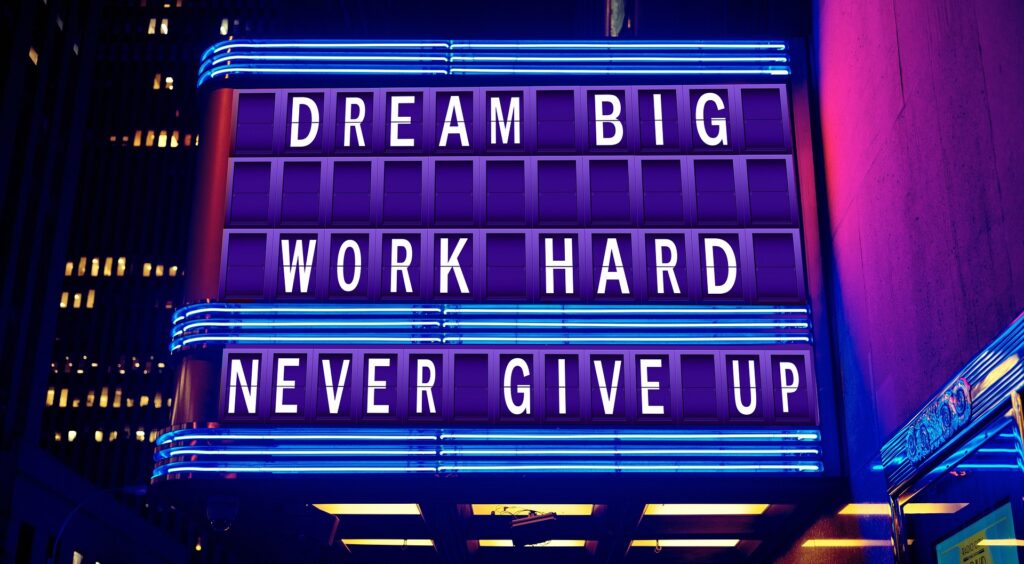A new approach: Dignity and the 4 types of maturity
Life can be downright thrilling, right? There are so many things going on that we just don’t grasp… yet. The moment we have our eureka moment, it floods the chambers of our brain with so much dopamine that we just can’t stop trying to figure things out. One of these eureka moments is realizing that we are running around with invisible signs about who we are – signs that we show to the world without even knowing it. It’s like the game “Who am I?” where everyone can see what’s written on your forehead except for yourself.

How do people perceive the signs?
Of course, they are not literally pieces of paper that are pinned on your body. But metaphorically, they are. And this starts from the very first moment somebody has you on their radar. The moment you sit on a bench, enter a room, or even just have a phone call, it conveys information about how much dignity you carry around, how much fear, how much motivation. You can imagine dozens of bars that represent characteristics that increase or decrease every time a person evaluates your demeanor. Naturally, the most dominant characteristics are visible to people. Unfortunately, we cannot see all the underlying views and traits that somebody holds. Next time you meet people on the street, try to define what you observe. But be cautious with your judgment. Body language usually doesn’t lie, however, our judgment is often biased. Don’t pigeonhole people just because you believe your judgment is well-developed.

Why is this useful for productivity or overwhelm?
Easy to answer: Our psyche (the ego) permanently evaluates the identity we currently hold. This is a critical message to memorize: the identity we currently hold. The ego doesn’t know that identity is temporary. Its endeavor is to tell our “self” that we’re fixed and permanent. This is a biological process of the brain and by no means unnatural. Fortunately, we are not fixed. Identity is formed by repetition. We don’t start to believe we are a rockstar just because we played the guitar once (well, depends on the level of alcohol and time of the day).
Every time we read 5 pages of our book, we contribute to the imaginary bar that says “you are a reader”. Every time we go through the feeling of discomfort, when we face our fear, we increase the bar of “self-worth”. Every time when we execute our moral values instead of skipping “sugar-free day”, we contribute to our bar of dignity. Passing a specific threshold of repetition, someday we wake up in the morning with the belief: Goodness, yes, I am a doer! Let’s rock this day!
Why is dignity so important?
Just look around. Walk through your city and look into people’s faces. Most of them have “given up” on themselves. That means they exist, but they don’t live. They don’t believe they can change anything in their lives. They don’t value themselves anymore, which is ultimately necessary to work towards our goals, dreams, and a better life. If your ego labels you as somebody without dignity, everything is lost. You start to redundantly please people, chase one dopamine hit after another, and hide behind material possessions. Possessions start to give you security in who you are, the desired model you were initially trying to be. It’s a downward spiral very hard to get out of, if you are not aware of it. But dignity is so much more than that…

Dignity has dozens of faces
Dignity is an integral pillar on which you build your roof. Leave it out and the house you live in becomes highly instable. The next flood, hurricane, or earthquake will shatter everything, including the people inside. Just to name a few characteristics that result in / and / or require dignity:
- Self-respect: Treating oneself with kindness and valuing one’s worth.
- Respect for others: Showing consideration and courtesy to all individuals, regardless of their background or status.
- Empathy: Understanding and sharing the feelings of others, especially in difficult situations.
- Compassion: Demonstrating a genuine concern for the well-being of others.
- Tolerance: Being open-minded and accepting of different opinions and beliefs.
- Integrity: Upholding strong moral and ethical principles, even when facing challenges.
- Honesty: Being truthful and transparent in one’s words and actions.
- Accountability: Taking responsibility for one’s actions and their consequences.
- Fairness: Treating all individuals equitably and without discrimination.
- Patience: Maintaining composure and understanding in the face of adversity or frustration.
- Grace under pressure: Remaining composed and dignified in difficult or stressful situations.
- Humility: Recognizing one’s limitations and imperfections without arrogance.
- Gratitude: Appreciating the positive aspects of life and acknowledging the help of others.
- Generosity: Sharing resources, time, and support with those in need.
- Poise: Exhibiting confidence and elegance in one’s demeanor.
- Forgiveness: Letting go of resentment and offering a chance for reconciliation.
- Politeness: Using courteous language and manners in social interactions.
- Listening: Giving others your full attention and respect when they speak.
- Advocacy: Standing up for the rights and well-being of oneself and others.
- Consistency: Demonstrating a consistent and principled approach to life and relationships.

3 questions to evaluate if you live a dignified life
- Would I want to be my own best friend or partner? If yes, why? If no, why not? Focus on the positives and work on transforming the negatives.
- Do I have values that I stand for? What are they? Am I living according to them, or am I living someone else’s life?
- Is what I do every day something I truly want? Or am I doing it because someone else expects it from me? Make sure that the majority of your week is dedicated to activities that mean something to you.
Bonus question: Do you do the same when nobody is watching?
Who am I?
Coming back to the game: You and others see and feel exactly as if you wouldn’t want to be your own best friend, if you respect yourself, if you live your life or the life of someone else, or if you love what you do or not. Not a single word is required to evaluate the “invisible bars” that you carry around your whole life long. Holding positive answers to the questions above makes you more patient in what you do, tolerant, creative, engaging, proactive, productive, persistent, attractive, radiant, and much, much happier. You are a masterpiece and a work in progress at the same time. Treat yourself like that.

The 4 types of maturity
Physical Maturity
How developed are you when it comes to treating your body’s needs? This starts from the need for food and ends with the need for proximity.
Mental Maturity
Do your cognitive abilities, such as decision making, rational thinking, reflection, adaptability, acquisition of knowledge, or problem solving, work well and evolve over time?
Emotional Maturity
As a subset of mental maturity, emotional maturity describes the ability to define and regulate emotions that arise through thinking. Emotional maturity allows you to bounce back more quickly from setbacks and develop resilience. Furthermore, it suggests eventually developing empathy over time, which enables you to see and feel things through the eyes of someone else.
SPIRITUAL MATURITY
Do you believe that you are solely a cog in the system, or are you deeply convinced that you belong to something greater than yourself? Spiritual maturity opens the floodgates to genuine gratitude, acceptance of what is, and the sustainable transcendence from animalistic needs to higher values.

The 4 types of maturity in action!
Evidently, most of the above-mentioned abilities and skills help you become more productive, cease procrastination, or get rid of overwhelm. Of course, not all of this is necessary. Everybody has a unique story and needs different qualities. One example:
Currently, there is an epidemic of loneliness going on in the Western world. That means even though people are interconnected with their relatives and friends via WhatsApp, Facebook or Instagram, people have diminished the frequency of meeting real people, having real conversations, and bonding deeply with others. On the other hand, you and I want to be as productive and successful as possible since we have aspirations and dreams. However, this is like saying, “I don’t have time to go to the toilet because I need to chase my dreams.” Well, Bill, that’s great for you that you have dreams, but your body dictates your basic needs, not you. Having genuine interactions with humans is one of those needs. If you don’t fulfill this basic need of your body on a regular base, you will feel empty and depressed, even though you have 10 million bucks in your bank account.
Let’s shift to a more specific issue. If you have matured emotionally, you have learned to regulate emotions properly. That means instead of escaping unpleasant feelings (by jumping right into social media, porn, or alcohol), you naturally define the emotion and trace it back to its roots. By doing that on a regular basis, you will develop the identity of a consistent human being. You don’t fall for the dopamine or consumer trap because you’re not escaping life (which is a huge challenge for all of us).
Back to the bigger picture: some of us have challenges in setting clear boundaries. A few classmates, your spouse, your boss, your children, or even strangers, tend to push you around as they desire. I was one of them. Only through rational thinking, emotional regulation, a significant amount of reflection, and much practice, allowed me to develop the skill of setting clear boundaries. This starts with refusing to tip for below-average service, to respecting one’s own free time, and becoming unavailable for customers after a specific time of the day (which results in less overwhelm). Dignity.

Last words...
Overwhelm, productivity and procrastination can be so multifaceted, that it’s hard to see the forest for the trees. Sharpen your focus and listen closely. You will recognize and prioritize what you need to work on if you truly want to.

Very great post. I just stumbled upon your weblog and wished to mention that I’ve truly enjoyed browsing your blog posts. In any case I’ll be subscribing to your feed and I’m hoping you write again very soon!
I appreciate that dear reader! New content will follow soon!